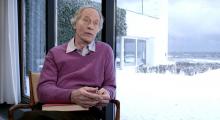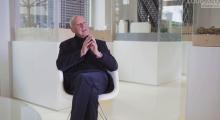"Graffiti is like flowers. They are beautiful, but they don't live long." An interview with Lebanese-Egyptian street-artist Bahia Shehab about the role of art during the Arab spring: "You cannot resist ideas. They can travel into any mind."
"I am a quiet person, I don't know how to scream", says Bahia Shehab. "My contribution to the revolution was to paint on the walls, was to be an artist." During the Arab spring many artists felt the urge to rush to the streets, Shehab explains. At the time, there was no tomorrow, one did not think of possible repercussions, she says: "When you loose hope with everything around you, you go down to the street. Your only hope is the people. This is who you paint and work for. It's their minds, you try to influence."
At the time Bahia became known for a series of graffiti centred around the word 'no' - No to Military Rule, No to Emergency Law, No to Stripping the People, No to Blinding Heroes, No to Burning books, No to Violence, No to Stealing the Revolution, No to a New Pharaoh besides others.
"Our work gets erased very quickly on the street. That's why TV and the internet are very useful tools - you can communicate your messages in the digital sphere. That's the game-changer now. The government can resist you, it can try to hide, what you try to communicate, but it's a completely different ballgame now."
"I believe, that art can change lives", Bahia Shehab continues: "It's a very powerful tool. It's a therapy. In some civilisations art is used to cure you from a disease." Art can be perceived by anybody on different levels. The more art there is in the public sphere, the better the society around it.
"In our case, we are not trying to install beauty. We have not yet reached that level. We communicate ideas of change to society. Because we believe in change and we believe in art as a tool for change. We are still on survival mode."
"It takes time to create change. New ideas are always opposed. Humans like normality, we like our comfort-zone. they don't like change, that is drastic. But enlightenment is not selective. Some people keep dreaming. Dreaming of a better future. We hope to grow the circle of dreamers. Society is not driven by people, that are pragmatic and realistic. It's only driven by the crazy ones, the dreamers."
Bahia Shehab (b.1977) is an artist, designer and Islamic art historian studying ancient Arabic script and visual heritage. Shehab is a Creative Director with MI7-Cairo working on projects relevant to cultural heritage and she is also associate professor of professional practice at The American University in Cairo. She has developed and launched the new graphic design program for the Department of the Arts with courses mainly focused on the visual culture of the Arab world. She is currently a PhD candidate at Leiden University in Holland. Her research is on Fatimid Kufic inscriptions on portable items in the Mediterranean basin and beyond.
Bahia Shehab was interviewed by Marc-Christoph Wagner
Filmed by Steen Møller Rasmussen
Edited by Kamilla Bruus
Produced by Marc-Christoph Wagner
Copyright: Louisiana Channel, Louisiana Museum of Modern Art, 2014
Supported by Nordea-fonden
Comments
Brought to you by LOUISIANA






